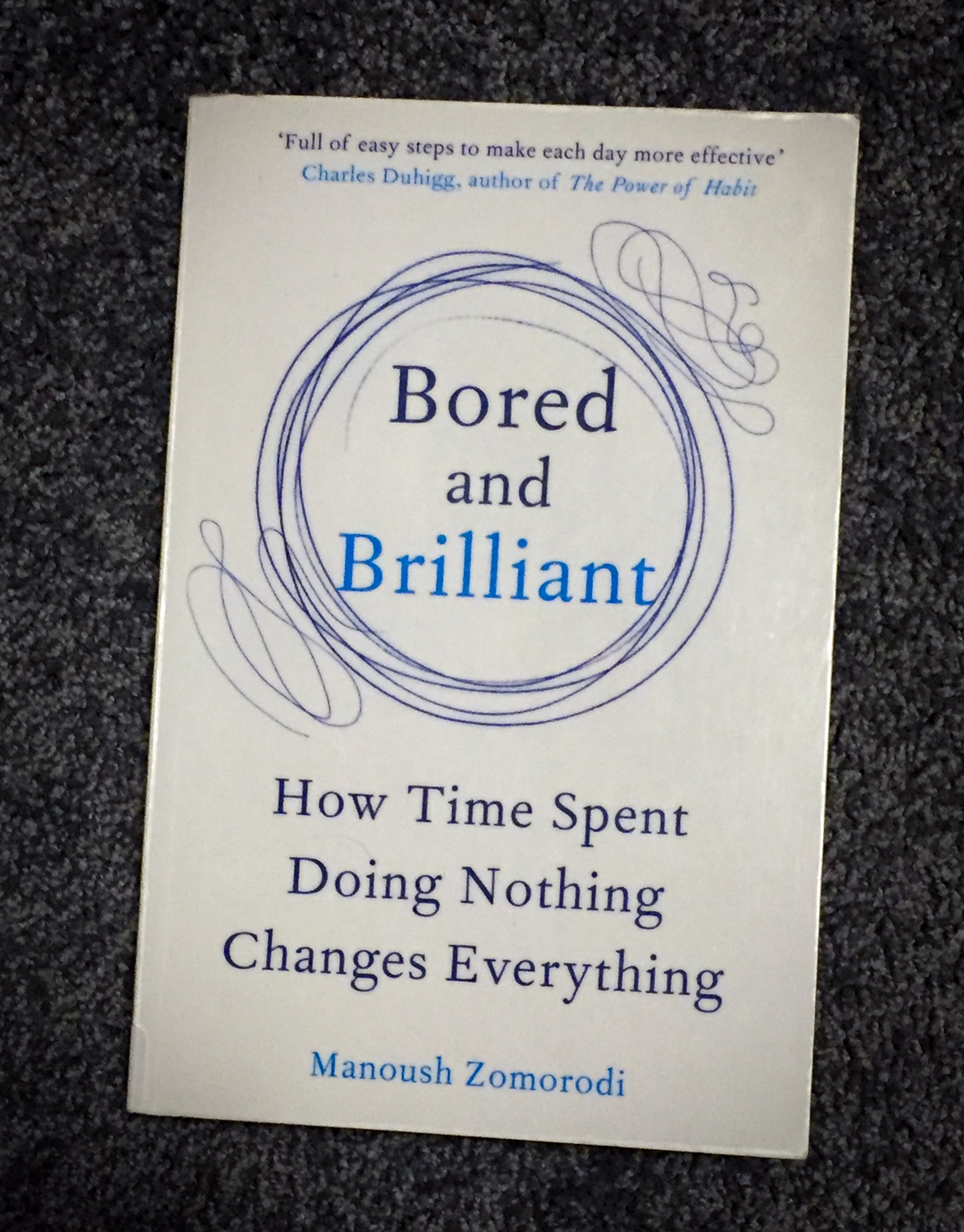Bored and brilliant
Coming to the end of my 30-day no alcohol challenge, I am itching to do another challenge.
I heard about the Bored and Brilliant challenge a long time ago on the podcast Note to Self by Manoush Zomorodi. It started out as an experiment to see what happened when people got off their phones. (I don’t think I’m selling this very well. It was several years ago and all I can remember is starting out with the challenge and dropping out halfway through.)
Okay, I found it:
In 2015, I led thousands of my listeners through a week of experiments designed to help them reassess their technology habits, unplug for part of each week and jump-start their creativity.
The week-long challenge turned into a book, Bored and Brilliant: How Spacing Out Can Unlock Your Most Productive and Creative Self, which “explains the connection between boredom and original thinking, and explores how we can harness boredom’s hidden benefits to become our most productive selves”. It does this by inviting readers to put their phones downs, to let themselves be bored and see what happens.
Manoush explains:
Throughout the book are a series of challenges that will help readers rethink their relationship to their devices without completely leaving the digital world.
The book also explores why putting greater emphasis on “doing nothing” is vital in an age of constant notifications and digital distractions. We speak with neuroscientists and cognitive psychologists about “mind wandering”—what our brains do when we’re doing nothing at all, and the link between boredom and creativity.
Bored and Brilliant is about living smarter and better within a digital world. Technology isn’t going anywhere, and who would want it to? It teaches us how to align our gadget use with what we hold dear and true, and find equilibrium in this new digital ecosystem.
The reason this came back to me now is that I’ve started listening to podcasts again, which I used to do regularly but stopped and have missed about 15 months of the ones I used to listen to. On Saturday morning I was catching up with one of my favourites, By The Book by Jolenta Greenberg and Kristen Meinzer. (The premise is that Jolenta and Kristen read a self-help book, then they live by the book for two weeks and report back on whether it had any effects on them or made any difference to their lives, often with very entertaining outcomes. They present their experiences in a light-hearted way and they make me laugh. If you have a love-hate relationship with self-help books, you might enjoy it too.) Anyway, the very first one I listened to on Saturday was the episode about Bored and Brilliant and I remembered I’d tried this challenge once before.
Kristen and Jolenta did the series of seven challenges over two weeks and it intrigued me so much I borrowed the book from the library, read it in a couple of days and decided to do the challenges myself.
Manoush describes the challenges as being designed to “build your capacity for boredom”.
They lead you step by step through an understanding of your relationship to your technology and where our brains and technology can conflict. We’ll experiment with different methods to help you create more mental space and engage in deeper and more productive thinking and, finally, help you jump-start your creativity and push you to think on a deeper level.
Seven challenges in seven days: all this in a week! It’s a big call. You can keep the challenges going for longer if you want to and my plan is to stretch them over about two weeks so I don’t feel too pressured to complete a challenge every day.
I could have cheated and copied the challenges from the podcast without reading the book (or I could have done the version on the podcast website but I want to have a better understanding of what it’s all about and the reasons for doing these particular challenges, so I did read the book. Deep reading, it turns out, is a skill we are in danger of losing. In chapter 2, Manoush writes about how the way we read on our devices is significantly eroding our capacity to read books and to read for deep understanding.
She says that the human brain is adapting so well to internet reading that we are losing our ability to slow-read because we aren’t doing it any more. Maryanne Wolf, director of the Centre for Reading and Language Research at Tufts University says in the book, “I worry we will not use our most preciously acquired deep-reading processes because we’re given too much stimulation.”
So I read the book. It was very thought-provoking. It’s by no means anti-device and anti-technology but more about our relationship with technology and our devices and how the constant stimulation may be preventing us from living more fully.
So, I am preparing to loosen my grip on my phone for the next few days and I’m looking forward to seeing what happens.